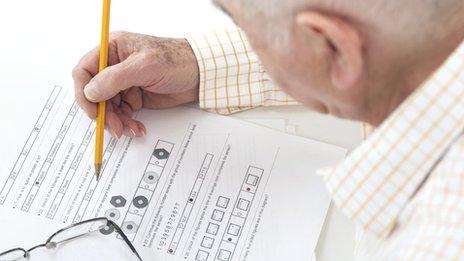Memory weakens but steadies with age, study finds
- Published

Forgetting things seems to be a part of getting older which everyone accepts. But could the confidence of the young be covering up their own memory slips?
Older people were more consistent in memory tests, research from Germany shows - although younger people did achieve overall higher test scores.
The assessments were carried out in Berlin on 100 older people - aged between 65 and 80 - and 100 people in their 20s.
They had to show up at the Max Planck Institute for Human Development in Berlin for 100 days of tests.
"We were very nice to them and had a good atmosphere at the labs," Professor Florian Schmiedek told the Health Check programme.
"People got to know each other, it was kind of a social activity for them. And we also paid them for those 100 days."
The brain remembers things by forming connections between its 100 billion neurons or brain cells.
Memories are formed when these connections - or synapases - are strengthened.
Information from the senses is sent to the brain's cortex, and then on to parts surrounding an area called the hippocampus.
These 'bind' the memory together, before it is sent to the hippocampus itself, where information about context or location is added.
"Working" memory - crucial for solving problems and making plans - is like a blackboard of the mind, located in the prefrontal cortex of the brain.
It is used to remember phone numbers long enough to make a call - but then it is usually forgotten unless it is passed on to the long-term memory for storage.
The tasks were designed to test different types of memory.
In one, the participants had to remember a list of words. Another had a list of numbers to memorise while simultaneously carrying out simple arithmetic on those numbers - to challenge their "working" memory.
Wide variability
The overall scores for older people were lower than the twenty-somethings.
It has long been known that cognitive performance drops as we age, with some loss of cells in the brain.
But Dr Carol Holland, director of the Research Centre for Healthy Ageing at the University of Aston in Birmingham, says we forget a lot less than we think we do.
"Long-term memory doesn't change in normal old age, we are just as good at remembering poetry learned as a child. Learning new things - that's where differences start to show.
"But there is lots of variability - one 80-year-old might learn just as quickly as a 19-year-old. Another 80-year-old might have real problems."
Dr Holland said the findings were encouraging in countering the stereotypes about older people being forgetful - and a reminder that ageing might not be at the root of the problem.
"An older person might attribute losing their keys to just having celebrated their 70th birthday - when really they might have always had problems with forgetting where they've put things."
Prof Schmiedek says the size of the study helped him to show that good and bad days exist.
"But that the variability is not as large as one might expect. It's more of a moment-to-moment fluctuation in performance that often creates the impression that we have good and bad days."
Prof Schmiedek whose research was published in the journal Psychological Science, was surprised by the difference between the two groups.
"If we compare younger and older adults, the interesting finding was that across the nine tasks older people fluctuated less day to day."
As well as testing their memory, the team also gave participants questionnaires to assess their mood. Older adults appeared to be more motivated to do well in the tasks and worried less about life and its stresses.
Work advantages
So does this make them more desirable employees? Prof Schmiedek thinks so - at least for certain types of jobs.
"With jobs that require maximum performance - brokers at a stock market or bartenders at a disco - where you have to do your job under time pressure, and multi-task with lots of distractions, then younger adults would be at an advantage.
"But if you look at more routine jobs, like manufacturing, then older adults' more reliable performance could put them at an advantage there."
Dr Holland also studies differences between older and younger drivers.
"Younger people assume they have fast reaction times, especially younger men. But they have an over-confidence issue.
"Older adults tend to be more cautious and careful, especially as the cost of them forgetting is more if they have some mobility impairment.
"Older people tend to adopt strategies which help them cope with any lapses in memory.
"A grandmother who has a poor memory never forgets her grand-daughter's birthday because she uses a calendar or notebook as a reminder."
This week has also seen a move in the UK to increase the eligible age of jurors to 75 - acknowledging the special experience and wisdom which older people have that may not be exploited at the moment.
Prof Schmiedek, now at the German Institute for Educational Research in Frankfurt, is about to look at the brainpower of those at the other end of the spectrum - school children who use smart phones.